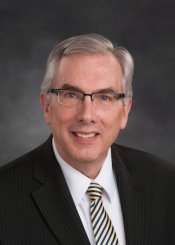President Donald Trump signed the 2020 Agriculture Appropriations Bill, Dec. 20, with a historic provision that will provide full funding to support American Indian students seeking the benefits of higher education at land-grant universities, which include tribal colleges. The bill passed both the House and the Senate prior to Trump signing.
New Beginning for Tribal Students authorizes the U.S. Department of Agriculture to match state funding for programs at land-grant colleges or universities that support American Indian students. The authorization is capped at $5 million per year and $500,000 per state.

South Dakota State University leadership, led by President Barry Dunn, worked with South Dakota’s delegation in Washington, D.C., to gain support for the New Beginning program. Rep. Kristi Noem, prior to becoming governor of South Dakota, proposed a USDA funding match that was later supported by Rep. Dusty Johnson. Sen. John Thune led the effort in the Senate with Sen. Mike Rounds. Rep. Johnson and Sen. Thune then led efforts in the House and Senate to secure the historic first-ever appropriation for the New Beginning program.
“The support and involvement of the South Dakota delegation in Washington, D.C., to get this provision in the Farm Bill and have it become fully funded with an appropriation has been extraordinary,” Dunn said. “South Dakota has certainly been a leader in working to provide opportunities for American Indian students to gain better access to higher education through the Wokini Initiative and to see that grow into an effort to provide that same access across the United States is very rewarding.”
Gov. Noem added, “This is another example of how South Dakota is leading the nation and how one idea can spark change; having a lasting impact on the next generation’s success. Not only will this bill have a positive impact on our American Indian families, it also aligns with one of my main priorities of strengthening South Dakota’s families. Strengthening families is a key element to every decision I make as governor, and I’m committed to keeping it at the center. I am very proud to have been a part of the support network of what is happening here.”
Dunn launched the Wokini Initiative at South Dakota State University early in his presidency to create greater access to higher education for American Indians in South Dakota. Funding for the Wokini Initiative has come through private donations to the SDSU Foundation and revenue generated by land as part of the South Dakota Permanent Trust Fund. Much of that land was claimed by the federal government in 1887 as part of the Dawes Act, assigning 160,000 acres to South Dakota to support its new land-grant college and agricultural experiment station.
New Beginning for Tribal Students gained support of universities throughout the country, including North Dakota State University, University of Nebraska-Lincoln, Oklahoma State University, University of Maine, University of Arkansas, Michigan State University and the University of Wyoming. The Association of Public Land-Grant Universities also supported the initiative.
“This is a milestone for American Indians throughout the United States as they look to the future and the opportunities afforded to attend, and graduate, from some of the best colleges and universities in the country,” Dunn said. “The Wokini Initiative’s initial pledge to develop and provide more sustainable financial resources for SDSU was a critical step to creating greater access to higher education for our native students, giving them a better chance to be successful.
“I am thankful for the many visionary leaders who saw that pathway through the Wokini Initiative and came forward to develop a plan that creates more opportunities for students throughout the U.S.,” Dunn added. “We are changing the dynamic that American Indian students face in higher education and giving them a chance to have a positive impact on their lives, those of their families and their communities.”
Republishing
You may republish SDSU News Center articles for free, online or in print. Questions? Contact us at sdsu.news@sdstate.edu or 605-688-6161.

